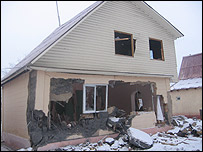
I must admit that I am not a terribly great fan of Hare Krishna adherents, but I view them much as Douglas Adams' Hitchhiker's Guide to the Galaxy rates Earth: Mostly Harmless. I do remember them being a visible community in Almaty, but they certainly never got in anyone's way.
Therefore I find it somewhat shocking to read this latest news of a literal attack and destruction on a Hare Krishna community by local authorities in Kazakhstan. As this article points out, this heinous action seems to belie the Nazarbayev regime's claim that it is a religiously tolerant and diverse nation. Apparently some religions are to be better tolerated than others.
It reminds me very much of a sad discussion I had with a Kazakh student two years ago, upon my first arriving in my city where I worked. This woman was an ethnic Kazakh, with a very good command of English and who has since become a teacher in that town. We were talking about religion, and she stated that she considered herself non-religious, and that Kazakhstan should be tolerant of many religions. But she then followed this statement with a strong condemnation of the city of Uralsk, not far from us. The reason? Uralsk has a Russian Orthodox church in its city center, and Kazakhstan is supposed to be the nation of Kazakhs, and Kazakhs must be Muslim. Despite my protestations, she apparently did not get the complete contradiction in her viewpoints. And this was a member of the educated youth!
I am not trying to slam the people of Kazakhstan. Probably all nations grapple with issues of religious freedom. Nor, to press the point home again, will I say that I am a great friend of those who seek to publicly push their religion on others, especially through missionary activity (and, although I am probably by their own definition no longer Catholic, I still take some comfort that my religion of origin has turned from pure missionary work to social justice programs and inculturation). To be honest, one wonders how much politics have to do with this act. Pentecostal missionaries are much more widespread - and obnoxious - than Hare Krishnas, but undoubtedly Kazakhstani authorities realize that an attack on them would mobilize religious zealots not least in the United States.
However, at the end of the day, it is not the business of a government to act more violent and obnoxious than this religious groups. If the groups are behaving peacefully, and not attempting to undermine the society that they live in, then the state should allow them to openly live their lives and speak their piece. Debate and cohabitation is the best possible test for the rest of us and our beliefs.
The rightness or wrongness (on a religious level) of their acts is not for political authorities to decide or to punish. And this oppression does not just extend to persecution, but to legal restrictions on the voicing of religious opinions. Kazakhstan, much like other countries in the Middle East and its environs, places strong restrictions on any political organizations advocating a religious or ethnocentric point of view. While this may seem necessary for cohesion in a young and fragile state, the suppression of any such sentiments will only make them come back in worse versions (just ask Algeria and Egypt). The government of Kazakhstan would do well to stop meddling one way or another with religion and with Hindu converts and get about their sorely-neglected business of attempting to improve their people's lives.
